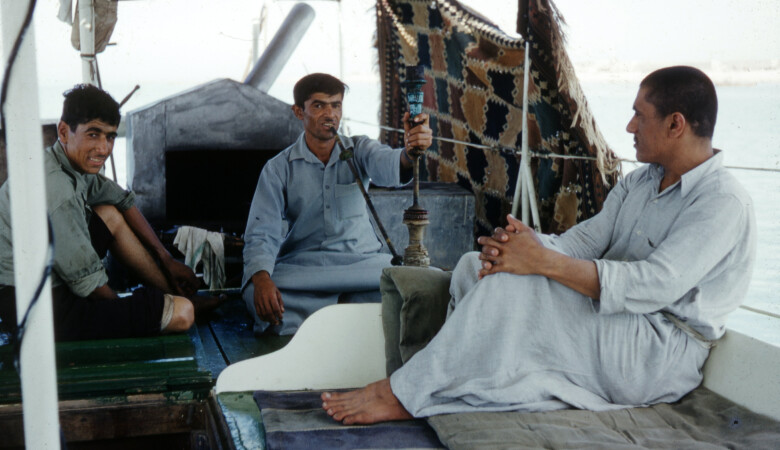Exalting Christ by Suffering Joyfully (Philippians Sermon 4 of 24)
October 05, 2003 | Andy Davis
Philippians 1:12-26
I. Paul’s Central Desire: That Christ Be Exalted
We’re looking this morning at Philippians 1:12-26. And as you give your attention to that text, I want to begin by asking you kind of a central question. What is your main purpose today? What is your goal? What do you hope to accomplish today? What is your goal for today? That’s kind of a strange question, but I’m asking it because you are to be a purposeful being. Why are you alive today? And not just today, but for your whole life? What is the central desire of your life? What is the one thing that if that did not get accomplished, your life would be worthless? What are you living for? And I think in Philippians 1:12-26, we have a clear statement from the Apostle Paul of what his central purpose was, and nothing else mattered other than that purpose. Ordinarily, as an expositor, I just begin at verse 12, in this case, and just move through, but I want to start at verse 20. Look at verse 20 and you’re going to see in verse 20, I believe Paul’s central purpose in his life. He says, “I eagerly expect and hope that I will in no way be ashamed but will have sufficient courage, so that now as always, Christ will be exalted in my body, whether by life or by death.” That Christ be exalted, now that was the central purpose of Paul’s life. That was his central desire.
In what way is God too small?
Now, this word “exalted,” “megaluno” in the Greek, is a fascinating word. It means to enlarge, to make bigger, to make greater. It’s used of a child growing up. It’s used of a king that expands his horizons, the horizons of his empire to make it larger. It’s used of a man’s fame and reputation, spreading far and wide. It’s used of the size and scope of one’s opportunities getting larger. It has to do with something being of a certain size and then getting larger, becoming greater. Paul’s deepest desire, then, is that that would happen to Christ. That Christ would be enlarged, that Christ would be made greater, that He would grow immense. Now, this is an odd thing. If you think about the Old Testament scripture verse that you’ve heard before, a worship verse in Psalms 34:3, it says, “O magnify the Lord with me and let us exalt His name together.” And we’ve been doing that this morning in worship. It’s been a delight and we’ve gotten together as believers in Christ and we have magnified the Lord. Literally, let’s get together and make God bigger. The more I go on like this, the more you see that it’s a strange way to think. How can you, a finite, sinful being, make an infinite God bigger? How can you make Him greater?
Solomon in his prayer of dedication for the temple said, “But will God really dwell on the earth? The heavens, even the highest heavens cannot contain you. How much less this temple that I have built?” The word “contain” there in that verse means hold in, like a container. It’s used of the bronze bath of 3,000 baths out front of the temple. 17,500 gallons, it contained. When you think about a milk jug on a breakfast table this morning, the milk was contained in the container. Solomon said, “There’s no container for you, God. The infinite universe is not big enough to hold you in.” And so we sang this morning, “Be exalted, O God, above the heavens.” The heavens aren’t big enough for you, God. Jeremiah the prophet said, “Can anyone hide in secret places so that I cannot see him? Declares the Lord. Do I not fill heaven and earth? Declares the Lord.” Yes, you do, Lord. You are an infinite, infinite being. The universe is immeasurably vast, able to hold trillions and trillions of huge stars, and it’s not big enough to contain the infinite God.
And so I’ve come back to that same question. How can finite, sinful human beings like us make God bigger? In what way is God too small? Well, he’s too small in our hearts and he’s too small in our minds, too. His reputation in this world is too small. People think too small thoughts of Christ all the time. And in that way, and in that way alone is Christ to be exalted, made greater, made bigger. I want to do that this morning. I want to think greater thoughts of Christ as a result of our worship time together. I want to have a far greater estimation of his magnitude than I did when I walked in here this morning. The issue is that he, that Christ, is too small to me and you and to the lost world around us. That’s the problem. And Paul lived that that would no longer be the case, that Christ would be exalted in his body. That’s what he wanted.
An example: Jupiter
By way of illustration, if you think about the planet Jupiter, it’s approximately 11 times larger than the Earth. It’s about 100,000 miles in diameter, could hold all the other planets in the solar system inside it. It’s an immense, immense ball of gas in the middle of space, but to us, it appears as a tiny dot of light. How can that be? Because we’re so far removed from it. It’s just one of the physical principles of light that the further away you are from something, the smaller it appears. And so it is relationally with God. The further and further we are away from him, the tinier he appears to us. In 1610, January, when Galileo pointed his new telescope up at Jupiter, he could see four moons orbiting Jupiter. It’s also, there’s some indication that he could see for the first time that great red spot, that giant red spot, which I think is twice as large as the Earth. Just immense, but invisible to the naked eye. The telescope made Jupiter appear larger to him, but it didn’t do a thing to Jupiter. It didn’t change it at all.
Christ’s Kingdom is too small
And so it is with our worship and with our evangelism and with all of these things, they don’t do anything to God in himself. He is, he always has been, he always will be immense, majestic, powerful and glorious. But he makes all of these things, worship and evangelism, makes God appear greater to us and Paul lived for that. That’s why he was alive. He said, “I just want to be used by you, God, that others would see you greater than they have before.” I want to exalt Christ. Christ is too small, therefore, not in reality, but in our estimation. And so, the Apostle Paul said, “Here I am today, use me, pour me out for your glory, that you be exalted. That your reputation will be increased, that people would see you as you really are.” Not only is Christ too small, not in reality but in our estimation, but Christ’s kingdom is too small.
God the Father had measured out a bigger scope than it presently contains. And so the kingdom must advance, it must grow. Revelations 7:9, which we have quoted many times, “After that, the Apostle John said, ‘I looked and there I saw before the throne and before the lamb, a great multitude that no one could count from every tribe and language, and people and nations standing before the throne and in front of the lamb, wearing white robes and holding palm branches and worshipping Christ.”And so God has marked out a bigger territory than Christ’s kingdom presently contains. And so therefore, his kingdom is too small. And at every moment, the Apostle Paul said, “I want to use my body, my time, my resources, that Christ be exalted.” I want him to be exalted. Now, he says in the verse, “I eagerly expect and hope that I will in no way be ashamed, but will have sufficient courage so that now as always Christ will be exalted in my body, whether by life or by death.” You see, therefore, the need for courage that Christ be exalted.
Also, the whole epistle is an epistle of joy. There’s a need for joy. And he says, “I am fully confident that I’m going to get everything I need that Christ would be exalted.” I’m not going to be ashamed of Christ. And I’m going to rejoice in my suffering, to the end that Christ be exalted.
And so that’s what the whole Book of Philippians is about, it’s what the whole New Testament is about, it’s what the whole Bible is about, that Christ be exalted. And it’s what Paul’s life was about too, in his body, whether by life or by death. That’s what he cared about. That’s the center of this text that we’re looking at this morning.
The advance of the Gospel
Verse 20. It’s an odd place to begin, I know, but I wanted to begin logically and not in order. So we’re starting at verse 20 and we’re saying this is the reason for everything. Now, what were the means to that end? God is a God not just of the end but of the means. How is he going to get there? How is Christ going to be exalted? There are two means, one is in verse 12 and the other in verse 25. For Christ to be magnified, there must be growth, right? There must be a greater and greater thing happening. There must be advance or progress. Now, look at verse 12. He says, “Now, I want you to know, brothers, that what has happened to me has really served to advance the gospel.” Do you see that word advance? It’s an important word. Now, what does he mean, what has happened to me? Well, he is in chains for Christ, he is incarcerated. He may be in a prison, he may be under house arrest but he is in chains for Christ. And he wants them to know that it’s actually served to advance the gospel.
II. Paul’s Two Subordinate Means: The Gospel Advance Globally and Individually
So the subordinate meaning number one is that Christ is to be exalted to the global worldwide advance of the gospel, that Christ is preached globally, worldwide, the global advance. The second is individual personal progress in Christ, and we see that in verse 25. He says, “I expect that I will continue with all of you for your progress and joy in the faith.” Do you see the word “progress”? If you were the kind of person that writes in your Bible, I’m not, but you may be, you would circle the word “advance” in verse 12 and the word “progress” in verse 25. They’re both from the same Greek word, prokope. They both mean the same thing.
This is where I get the idea of Two Journeys, two things that we’re making progress in:
-
The worldwide global advance of the gospel among the nations through the preaching of Christ is the “advance” in verse 12;
-
And then individual progress made by specific Philippian Christians, that we as believers would make progress in Christ for the gospel is the “progress” in verse 25.
Paul cares nothing for his physical life except for those two things. That’s why he lives. He lives that Christ will be magnified through these two ways, that the gospel be advanced globally, and that you Philippian Christians would make progress in your faith. That’s why he’s alive, and he’s very clear about that. It was all about progress. Now, the Philippian epistle, the whole letter, is very clear about the need for progress. We’ve already seen it in that majestic verse, in verse 1:6, “He who began a good work in you will carry it on to completion until the day of Christ Jesus.” That’s of that second category, that second type, that individual Christians would be built up to full, Christ-like maturity. There’s going to be progress made. It says the same thing in chapter 2, in which he says, “Work out your salvation with fear and trembling for it is God who works in you to will and to act according to His good purpose.” -again, individual progress.
And then he speaks about his own individual progress. He says in chapter 3:12, “Not that I have already obtained all this or have already been made perfect, but I press on to take hold of that for which Christ Jesus took hold of me.” There’s internal progress that Paul is making.
Same thing in 3:14. He says, “I press on toward the goal to win the prize for which God has called me heavenward in Christ Jesus.” So the whole letter is an epistle of progress, of making progress in the journey. And we get that out of 1:12, “What has happened to me has served to advance the Gospel.” And 1:25, “I expect that I will stay for your progress in the faith.” Those are the subordinate meanings. So number one, that Christ would be exalted. Well, how is He going to be exalted? By growth in two ways- globally through the preaching of the gospel worldwide, and individually through each Christian growing up to full maturity in Christ.
III. God’s Chosen Strategy: Pouring Paul Out Like a Drink Offering
What is your strategy, Lord? Can you imagine a strategy conference between the Apostle to the Gentiles, Paul, and Jesus Christ, his Lord? “Here I am, Lord, I’m finally converted after all that time, the road to Damascus has happened and you have, for some reason, appointed me Apostle to the Gentiles. There’s a huge gentile world out there. Romans and Greeks, Scythians and all kinds of folks that need to come to faith in Christ. I am willing to preach one rally after another. I’m willing to go from city to city to preach to tens of thousands. I’m willing to do anything for you. What is your strategy?”
Well, the Lord would say, “This is my approach. I’m going to put you in chains under house arrest or in prison somewhere, and you’re going to sit there. And I’m going to bring one Praetorian guard a day, or maybe two or three a day, and I’m going to give you that one shot every day. Make the most of it. Make the most of it. ”
Now, God’s ways are not our ways. His thoughts are not our thoughts. “As the heavens are higher than the earth, so are his ways higher than our ways and his thoughts higher than our thoughts.” We would think, “What a waste! Here’s this fluent, confident, powerful preacher for Christ, and you’re going to lock him up with one Praetorian guard a day, or two or three at the most?” But God knew what he was doing. Do you realize that within the end of the first century AD, church history shows that there were local congregations planted in the North of England? There were Christians at the end of the first century. How do you think they got there? Look at verse 13. He says, “As a result, it has become clear throughout the whole palace guard,” in the NIV, do you see the palace guard there? Praetorian is the Greek word. Now, the Praetorian guards were the elite. They were the cream of the cream. They were the best. They were Caesar’s personal bodyguard and his emissaries all over the world. They were the sharpest soldiers, the best soldiers in the world. They were world conquerors. And Paul was chained to at least one of them a day.
God’s chosen strategy, then, for Paul, was that he be poured out like a drink offering. Now, first century prisons involved immense suffering. You remember the scene of Paul and Silas in that darkened dungeon in the middle of the night singing praise songs. It was all they could do because it was such a horrendous situation. There was no food, no water, there was no light, nothing but suffering. And so it was for the Apostle Paul, and it was that way right from the very beginning of his life when he was first called to be an apostle, when he was first called to be a Christian. Ananias went to lay hands on him and heal his eyes and to baptize him as a Christian. And Ananias did not want to go. And the Lord spoke to him and said, “Go. This man is my chosen instrument to carry my name before the Gentiles and their kings and before the people of Israel. I will show him how much he must suffer for my name.” And he had been showing him. He had been showing him day after day, week after week, month after month, and year after year, showing him how much he had to suffer for Christ.
IV. Paul’s Daily Example: Joy and Boldness in Suffering
In Acts 20, Paul says, “I only know that in every city the Holy Spirit warns me that prison and hardships are facing me. However, I count my life worth nothing to me if only I may finish the race and complete the task the Lord Jesus has given me, the task of testifying to the gospel of God’s grace.” And what were those sufferings like? Well, he gives a litany of them in 2 Corinthians chapter 11, he says, “I have worked much harder, been in prison more frequently, been flogged more severely and been exposed to death again and again. Five times I received from the Jews the 40 lashes minus one. Three times I was beaten with rods, once I was stoned, three times I was shipwrecked. Three times I was shipwrecked. I spent a day and a night in the open sea. I’ve been constantly on the move. I’ve been in danger from rivers and danger from bandits, in danger from my own countrymen, in danger from Gentiles, in danger in the city, in danger in the country, in danger at sea and in danger from false brothers, I have labored and toiled. And I’ve often gone without sleep. I’ve known hunger and thirst, and I’ve often gone without food. I have been cold and naked. Beside everything else I face daily the pressure of my concern for all the churches.” That was the nature of Paul’s life.
And even in Philippians 2 we see it. In Philippians 2:17, he says, “Even if I am being poured out like a drink offering on the sacrifice and service coming from your faith, I am glad and rejoice with all of you. So you too should be glad and rejoice with me.” Poured out like a drink offering, that’s just like wine poured on the fire of sacrifice. That means poured out unto death. And he said, “Even if that’s what happens to me, poured out like a drink offering, I rejoice.” And so God’s strategy for worldwide global advance and for the individual progress of the Philippians was suffering for the messenger, namely the Apostle Paul. Very much following after Jesus’ pattern in John 12:24, “I tell you the truth, unless a kernel of wheat falls to the ground and dies, it remains by itself a single seed, but if it dies it bears many seeds.” And so here’s the thing, Christ should be exalted and magnified. How? Through the global progress of the gospel and the individual progress of Christians in the gospel. God’s strategy is suffering for both of those, and apart from suffering, neither one happens. It’s impossible.
Alright, well, now we get to the core of this whole section, verses 12-26. And the core really has to do with attitude. It has to do with your attitude, how you feel about it. He said, “I want you to known brothers, that what has happened to me has really served to advance the gospel.” I want you to know it and I want you to know my attitude toward this. Paul actually was going through suffering. He actually was suffering for Christ. It wasn’t just theory. It’s one thing for us here at First Baptist Church, in these pews and in our clothes and all that, to talk about suffering for the gospel. Paul didn’t just talk about suffering for the gospel, he was going through it. God was putting him on display. Nobody lights a lamp and hides it under a bushel. Instead he puts it up on a stand and gives light to everyone in the house. He was putting Paul on display, and so he was going through suffering. And every day he was willing to suffer more. “I want to preach the gospel, I want to preach Christ, I want to preach boldly.”
William Tyndale
I think about the story of William Tyndale. He was arrested for translating the Bible, the scriptures, into the common vernacular, into English. And Tyndale’s words are immortalized in the King James Version. Most of the King James Version comes from Tyndale. He’s an amazing linguist, translator. And what brought great suffering into his life was this translation work, he was arrested for it, put in prison. He was in a freezing prison cell in the Netherlands. And he wrote to the officials who were in charge of his incarceration with a request, he said, “I would like a warmer blanket, I would like a coat and a hat. But above all, if you send me none of these things, please send the following: My Hebrew Bible, my Hebrew grammar, and Hebrew dictionary so I can continue my work.” Now, that’s bold. Alright, it’s cold here in the Netherlands, especially in the winter, so send a hat and a blanket and a coat, but if you don’t send any of those things, send me my Hebrew work so I can keep going in my translation. That’s the boldness of the messenger of God.
John Bunyan
Same thing with John Bunyan, a Baptist preacher in prison for preaching the gospel in England without a license. He was offered his freedom again and again, if he would just simply make a promise not to preach anymore. It’s one thing to be incarcerated, but it’s another thing to be incarcerated when you have the key right in your hand. When you can walk out any time you want if you’ll just make a simple promise that you will not preach without a license again. And he suffered greatly. He said, “The parting of me from my wife and my children has been as the ripping of my flesh from my bones.” It caused him intense psychological suffering to be away from his wife and his blind daughter. And yet he refused to give up preaching the gospel and he said to his jailer, when offered again if you will just simply promise not to preach anymore, he said, “I can make you this promise, if I am free today, I will preach tomorrow.” And so he stayed in prison and he refused to give in to self-pity. He refused to give in to the blackness of despair and discouragement. He just wrote Pilgrim’s Progress. He made the most of his time.
And so Paul’s attitude is put on display, “I want you to know how I think about my suffering. I want you to see my attitude. I’m in chains for Christ and I’m glad and I rejoice. Now, God’s strategy is he’s bringing me one Praetorian a day, at least. If I act like all the other pagan prisoners, what effect am I going to have on that Praetorian guard? None. But if, on the other hand, I live and preach and act and display Christ so clearly that when that man walks out, he’s wondering who is the prisoner, and who’s the free man? Then God can use what’s going on for me.” The principle of the mustard seed will take over. One day with one Praetorian is worth more than a hundred preaching in front of huge crowds if God is in the one and not in the other. “And so just give me my one guard today, I’m going to make the most of it. I’m going to make the most of it.”
V. The Fruit Already Seen
And so we’ve already seen fruit. There’s specific fruit that’s already come. Look at verse 14. He says, “As a result of my preaching, most of the brothers in the Lord have been encouraged to speak the word of God more courageously and fearlessly.” In essence, “My brothers and sisters are preaching more boldly because they see what’s happening to me. I’ve already been arrested, I’m suffering, and yet I’m thriving. I’m closer to Christ than I ever was before. And they’re saying, ‘Whatever he has, I want some of that. I’m not afraid anymore.’ And they’re bold to go out and preach. And so, my one imprisonment has made a bunch of preachers and sharers of the gospel and evangelists. They’re bold now. They’re not afraid anymore.”
And so it is with us when we read testimonies from Voice of the Martyrs, or some of these other things of our brothers and sisters in Christ in China and in Muslim countries that are going through great physical suffering for Christ, and they’re not yielding. It gives us courage. We’re willing to pay the price to witness to a co-worker or to a neighbor, or a relative, somebody sitting next to us on an airplane. Ours is a small price to pay and there is almost a sense of shame that we would even hesitate, compared to the suffering that others have gone through. And so we’re willing to pay the price. And so look at the good fruit, look at the good things that are coming. “Because I am thriving in prison. I’m not gloomy, I’m not depressed, I’m not irritable, I’m thriving, I’m joyful, I’m trusting God, the brothers in the Lord have been encouraged to be bolder with the gospel, too. And an odd thing has happened, too- some of my enemies are preaching the true gospel.” What an odd thing.
The strangest people
I said when I mentioned this a few weeks ago, these are some of the strangest people in the whole Bible. I don’t understand them. Preaching the true gospel to get Paul in trouble? That’s an odd thing, really. Now, we mentioned at the time that if they were preaching a false gospel, Paul would put the anathema on them, they’d be eternally cursed if they preached the false gospel, but they didn’t do that here. So they’re preaching the true gospel from bad motives- trying to stir up trouble for him while he’s in chains. And he says, “What do I care? I might die today, it doesn’t matter what happens to me. The important thing is that Christ is being exalted, that he’s being magnified through the preaching of the true gospel. That’s what matters to me. So we’re seeing good things and I still get my one Praetorian every day. Some of them have requested to be chained up with me again!” They want part two with that man! “He’s an odd guy, but I feel differently when I talk to him. Things become clear, and then other things become a little muddled, and I just want to talk to him some more.”
Now, we don’t have any record that there were any Praetorians that specifically requested to be chained to Paul the second time. But we do have something. Look at the end of this book, in Philippians 4:21, he says, “Greet all the saints in Christ Jesus. The brothers who are with me send greetings.” And then he says in verse 22, “All the saints send you greetings, especially those who belong to Caesar’s household.” Hmmm. Now, read between the lines. What’s going on here? Could this be the Praetorian Guard? Could it be that some of them have come to faith in Christ? Could it be they’ve led some of Caesar’s relatives, some cousins, some sisters, brothers to Christ? Could it be that the gospel is making the kind of progress it would have needed to make for the Roman Emperor to declare himself a Christian three centuries later? Oh, yes!
The gospel is making good progress. It’s working. Christ is being exalted in my body. By the worldwide advance of the gospel as God gets a bunch of secret service zealous Roman soldiers to come to faith in Christ, and go to Northern England and preach the gospel there. Fearless men they were. Bold and courageous, coming to faith in Christ, leading some of Caesar’s relatives to faith as well. “It’s working! The gospel’s advancing around the world! Gentiles are coming to faith in Christ. The gospel is being preached. And, meanwhile, my example is helping individual Roman Christians grow in their faith. And Philippians, I want you to grow, too. I want you to be bold. I want you to be confident. I want you to stand firm for the Lord.” He’ll get to that at the end of chapter 1. “Conduct yourselves in a manner worthy of the gospel.” I want you to grow. It’s all happening. But attitude is the key.”
VI. Paul’s Greatest Pressing Need: Protection of His Joy and Boldness
Now, let me ask you a question. You don’t need to answer, but just think about it. If you entered that trial with the same attitude with which you enter most of the trials you face in your life, what kind of fruit would have come from your incarceration? How do you carry yourself when your vessel is upset and jolted a bit? What comes out? What reveals itself at that time? And that’s a convicting question for me, too. Do I rejoice when suffering and trouble comes to me, because then I can put Christ on display and exalt and magnify him through my troubles? I want to. I yearn that my life would be used that way. And Paul felt that too. Paul was not a superman, he was flesh and blood. And so therefore his greatest need, he then reveals to the Philippians, it’s not that he would be released. “Get me out of here! Thanks for the money, but get me out of here!” He’s not saying that. He does say thank you for the money in chapter 4, but he doesn’t say, “Get me out of here.” He says, “Pray for me. Pray for me that I’ll keep having a joyful, spirit-filled, godly Christ-like attitude.” That’s the key to the whole system, “Pray for me.”
He asked for prayer. His pressing need was prayer, not that he would be released. He says in verses 18-20, “Yes, and I will continue to rejoice for I know that through your prayers and the help given by the Spirit of Jesus Christ, what has happened to me will turn out for my deliverance.” My deliverance from what? Well, “I eagerly expect and hope that I will in no way be ashamed, but will have sufficient courage so that now, as always, Christ will be exalted in my body.” “I need deliverance from shame. I need deliverance from weakness. I need deliverance from cowardice. I need deliverance from worldliness. All these things that sap the strength of the gospel power working through me. So Philippians, pray for me, that’s what I really need. I need deliverance from wickedness and sin so that Christ will be exalted in my body through my confident, bold, joyful proclamation.”
And so, there’s a partnership, “Philippians, join with the Holy Spirit of God in giving me what I need to see my ministry through.” He says, “You know, I’m not eager to get out of here. I wouldn’t mind dying. I’d be happy to do that.” We’ll talk about that, God willing, next time. Verse 21, “For me to live is Christ and to die is gain.” “If it’s my choice, I want to leave and go and be with Christ, which is better by far. But it’s better for you if I stay. And so, I’m not praying to get out of here. I’m not trying to get out of my circumstance. No, no, I’m praying that I will be bold and courageous for the gospel for Jesus Christ. And so please keep praying for me.”
VII. Application to the Philippians and to Us: Live Worthy of the Gospel
Now, what application can we take for this for ourselves? Well, I look at verse 27, now, we’re not going to get there until probably, God willing, two weeks hence, that says, “Whatever happens, conduct yourselves in a manner worthy of the gospel of Christ. Imitate me.” It’s in effect what he’s saying. When you are suffering for the gospel, be joyful, be bold, be courageous, stand firm, don’t be afraid, but keep preaching, keep preaching the gospel so that Christ will be exalted. And so, I say to you first, fix your heart on Christ and on His glory first above all things, live for that. Let that be the center of your day to day. I asked you at the beginning, what are you alive for today? What is your purpose today? What’s your number one goal? Let Christ be exalted in your body, whether you live or die. Number one, set your heart on that. Now, you cannot do that if you’re a non-Christian. If you come in here today and you don’t know what I’m talking about, and you have never given your life to Christ, you can’t set your heart on Christ’s exaltation until you come to faith in Christ.
And it wouldn’t do for you to come hear me talk about the preaching of the gospel to others and you miss it yourselves. Jesus died on the cross for sin, that he might bring you to heaven. Don’t leave this place without trusting in Christ today, without talking to me or to some brother or sister and say, “I need Christ, I want him to be my Savior today.” But if you’ve already trusted in Christ, then set your heart above all things on this, that Christ be exalted in your body. And then, live for the magnification of Christ through the worldwide global advance of the gospel and through your own progress in Christ. Live that Christ be exalted that way. Spend your time that way. Spend your effort that way, your money, spend it that way. Your resources, everything, spend it on that. The worldwide advance of the gospel and yourself, progress in Christ.
Come to the sharing and the witnessing next Sunday after worship. Now, there’s a practical application. We’re going to be going door to door, witnessing and trying to lead people to Christ. You may be able to lead someone to Christ, or you may get a door slammed in your face. Count it all joy, just like Paul did. But come and serve next Sunday. And understand that no progress can be made without some kind of suffering. And then finally, if I could urge you to pray for suffering Christians around the world. You notice in this text, Paul says, “Please join me in my struggle by praying to God for me.” Do you know you have brothers and sisters in Christ that are getting beaten, probably right now as I speak, because they’re Christians? I think in all the world, there may be no worse physical situation to be in than to be incarcerated by a torturer. I mean, think about it, it’s worse than any disease, it’s worse than any physical situation that you can think of, that you would be incarcerated by somebody who’s using their mind and their creativity to bring you pain and suffering. And there are brothers and sisters in Christ, in China and Muslim countries and Hindu places that are facing those kinds of things. Pray for them. Hebrews 13:3 says, “Remember those who are in prison as if you were their fellow prisoners.” Sustain them in prayer.
























